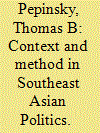| Srl | Item |
| 1 |
ID:
165142


|
|
|
|
|
| Summary/Abstract |
This article contributes to the discussion about China's divisive influence on the Association of Southeast Asian Nations (ASEAN). It argues that recent China–ASEAN relations are based on Beijing's successful implementation of a dual strategy of coercion and inducement. The effectiveness of this strategy is tested against the South China Sea disputes – the issue that lies in the core of regional security and a key platform of power display. The article outlines Beijing's recent interaction with individual ASEAN member-states and its implications for the regional multilateral diplomacy. While by no means identical, Beijing's dual strategy of coercion and inducement with individual ASEAN states have resulted in an effective abuse of the ASEAN consensus principle – a tactic often referred to as ‘divide and rule’. Consequently, the group's internal discord has further eroded and affected the institutional confidence of ASEAN. This article draws attention to the psychological effect of coercion as a perception of punishment, and inducement as a perception of reward.
|
|
|
|
|
|
|
|
|
|
|
|
|
|
|
|
| 2 |
ID:
133784


|
|
|
|
|
| Publication |
2014.
|
| Summary/Abstract |
This essay introduces and evaluates a central debate about context sensitivity in Southeast Asian political studies. Within this diverse field, there is no agreement about what context means, or how to be sensitive to it. I develop the idea of unit context (traditionally, the area studies concern) and population context (traditionally, the comparative politics concern) as parallel organizing principles in Southeast Asian political studies. The unit context/population context distinction does not track the now-familiar debates of qualitative versus quantitative analysis, nor debates about positivist epistemology and its interpretivist alternatives, nor even political science versus area studies. Context is not method, nor epistemology, nor discipline. Rather, the core distinction between unit-focused and population-focused research lies in assumptions about the possibility of comparison, or what methodologists call unit homogeneity. While I conclude on an optimistic note that a diverse Southeast Asian political studies (embracing many disciplines and many methodologies) is possible, the fact remains that unit context and population context are fundamentally incommensurate as frameworks for approaching Southeast Asian politics, and that population context is the superior approach.
|
|
|
|
|
|
|
|
|
|
|
|
|
|
|
|
| 3 |
ID:
074677


|
|
|
|
|
| Publication |
Singapore, ISEAS, 2006.
|
| Description |
ix, 206p.hbk
|
| Series |
IIAS/ISEAS Series on Asia
|
| Standard Number |
9789812303851
|
|
|
|
|
|
|
|
|
|
|
|
Copies: C:1/I:0,R:0,Q:0
Circulation
| Accession# | Call# | Current Location | Status | Policy | Location |
| 051913 | 959/CHO 051913 | Main | On Shelf | General | |
|
|
|
|